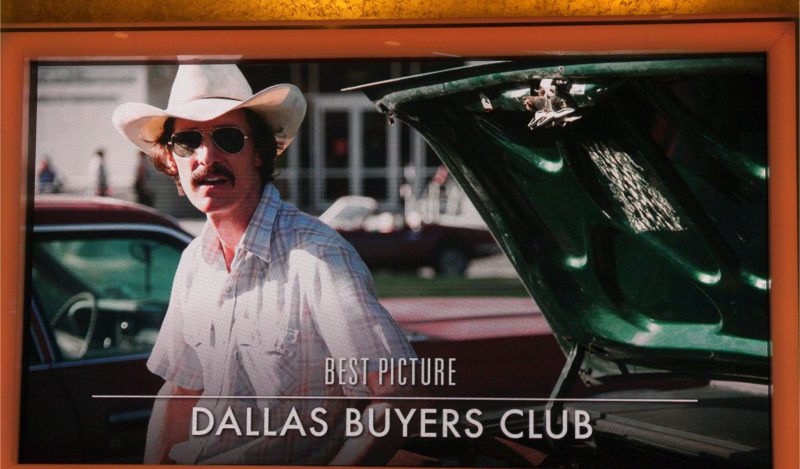The late film critic and journalist Roger Ebert once had an online Q&A column he called The Movie Answer Man. He would take questions from readers each week on a range of cinematic topics. One correspondent in Oct. 2000 asked, in a roundabout way, why conservatives and Republicans were so often portrayed as antagonists in movies — in other words, that age-old observation of “liberal Hollywood.”
Ebert replied:
“This is not a conspiracy but a reflection of the tendency for liberals to be drawn to the arts while conservatives channel their energies elsewhere. There are of course exceptions. Bruce Willis and Arnold Schwarzenegger have the clout to make a pro-GOP movie if they wanted to.”
Despite that clout, Hollywood Republicans have never made their conservative masterpiece. That is because their issues aren’t exactly filled with joy. Tales of lobbyists, tax cut initiatives, or the immigrant family that gets turned away at the border by a citizen militia wouldn’t pack theaters. People want stories that buoy the human spirit, narratives that have traditionally been the domain of liberal and leftist storytellers.
This is why Erin Brockovich and thousands of other such rebellious underdogs make such great fodder for storytelling. If Brockovich had lost her case against the corporate behemoth, audiences would not have flocked to see the tale of how a natural gas company poisoned a town and crushed the gutsy single mother who naively tried to take on capitalist malfeasance.
Right-wing dogma only makes for great art when it’s being lampooned, such as in Tim Robbins’ 1992 film Bob Roberts, about the folk-singing Republican who campaigned with tunes such as “The Times Are Changin’ Back,” “Wall Street Rap,” and “Retake America.” TV shows like Succession, or movies like The Wolf of Wall Street and The Big Short, are captivating for the way they expose greed, not for the heroics of their leads.
This is not to trumpet the virtues of the left. Although I categorize myself in the socialist corner of the political chart, I have my own conservative tendencies. I only argue that no matter what conservative ideas I might agree with, none would make for good art.
A society’s health can be measured by its tolerance for creative and intellectual output that challenges establishment norms. Think everyone from Jack Kerouac to Oliver Stone and what came in between — an artistic renaissance in jazz, poetry, rock n’ roll, boundary-breaking literature, underground journalism, modern art and independent cinema.
Movements had their leaders and flag-bearers. Blacks had Martin Luther King Jr, gays had Harvey Fierstein and Larry Kramer, the working class had hundreds of “Norma Raes” fighting for labor rights, feminists had Betty Friedan and Gloria Steinem. In the arts, there were Dylan, The Beatles, Warhol, Hunter S. Thompson, Martin Scorsese.
Some of these people were not mainstream, but their presence in the culture was accepted by liberals. Their advances in music, literature, film and the visual arts were permitted to accompany civil rights, feminism, anti-war movements, exposure of government corruption, burgeoning labor unions, gay-rights advocacy, environmental activism, and so on.
Today’s culture has no soundtrack nor screenplay, a sign of an ill society. This is because about five years ago, liberals began “canceling” artists and academics, thus preventing intellectual progress from seeping into the mainstream — or eliminating prior progress altogether. Eric Clapton’s charity concerts for Asian tsunami relief and Caribbean addiction recovery centers, for instance, now count for nothing. He has been branded a racist for speaking about his experience with Covid vaccination, and of course, raising money for blacks and Asians, along with recording an album with B.B. King, are exactly the things a racist would do.
In place of art and intellectual thought, today’s liberal culture fosters the same moralistic censorship and “fear of the other” narratives that once came from the likes of Reagan-Thatcherite conservatives.
If you doubt that, just try writing a folk song about canceling a professor. It would sound more like Bob Roberts than Bob Dylan.
The odd pairing of liberalism with cancel culture was pointed out well by Matt Taibbi last July:
“If sixties liberals were able to sell their message to the rest of the country by making music even squares and reactionaries couldn’t resist, the woke revolution does the opposite. It spends most of its time constructing an impenetrable vocabulary of oppression… Its other chief characteristics seem to be a total lack of humor, an endless, crotch-sniffing enthusiasm for hunting skeletons in closets, a love of snitching and decency committees…”
These habits have extended into Covid culture, especially the hunting for skeletons (the unvaccinated), the snitching (on unvaccinated neighbors), and the decency committees (those who uphold mandates and “freedom passports”).
If this is today’s left, where is our new Bruce Springsteen or Joan Baez singing in support of the lockdown agenda? Where is that great anthem railing against the unvaccinated, or that visual arts installation that depicts mask-wearing and vaccine mandates as civil liberties that “fringe scientists” threaten to rob from us? Who are the cultural leaders of the Covid era who will be remembered in the printed word or the cinematic portrait?
In fact, the great intellectual thought emerging from our times is coming from those opposing vaccine mandates and Covid fearmongering. These names run across the political spectrum, but those from the left are universally categorized by liberals as being “alt-right” or “fringe libertarian,” ensuring that they remain marginalized and carry whatever stigma goes along with being relegated to the internet.
Among those I’m thinking of: Charles Eisenstein and Paul Kingsnorth, who have produced volumes of philosophical writings filled with humanity and drawing from spirituality, myth, and history. Satirist and playwright CJ Hopkins has devoted countless essays dismantling what he calls the “Covidian Cult” with equal parts humor and cynicism. Independent journalists Matt Taibbi (formerly of Rolling Stone), Michael Tracey, Max Blumenthal and Jimmy Dore have devoted much of their recent work to exposing the misguided logic of the mainstream fear trade.
Evolutionary biologists Bret Weinstein and Heather Heying have used their podcast to contribute a great number of thoughtful and sometimes provocative interviews and talks that have challenged Covid orthodoxy. Not to mention the trove of sober thought found on this website.
When a liberal vehemently dismisses one of the above-mentioned thinkers, I want to ask: What sort of creative, philosophical output has come from your corner? What kind of cerebral work could come out of defending vaccine mandates?
Take one example from the mainstream narrative: “The unvaccinated are a threat to society.” You can agree with that statement if you wish, but it cannot be defended in a thousand-word essay. Unpacking the sentiment reveals that it is a fear-based desire for personal security, something that can be defended in about 20 to 50 words.
If forced to write further than that, one must think beyond fear and gut reaction, and look for scientific and humanitarian backing for the argument. Upon finding little intellectual support for the idea, the critical thinker is forced in the other direction.
Going down that route, one could find, for instance, Eisenstein’s essay “Mob Morality and the Unvaxxed,” in which he looks at how societies throughout history have used ritual sacrifice to unify communities, a piece that is as educational as it is enlightening. Kingsnorth writes in a similar spirit about how scapegoating and manipulation of public fear have become the story of our times.
The artlessness of today’s mandate enthusiasts is a clue as to which side of history they will land on.
One just has to consider a film like Dallas Buyers Club, which dramatized the true story of a group of AIDS patients in Texas that had to surreptitiously smuggle their life-saving medications from Mexico. Nobody has made a film about Anthony Fauci saving lives by withholding those drugs during his tenure in the 1980s as director of the National Institute of Allergy and Infectious Diseases, all the while pushing AZT, an extremely toxic drug that turned out to be “worse than the disease, and killed [gay men] faster than the natural progression of AIDS left untreated.”
Fauci’s role during the AIDS pandemic could possibly be defended, but it could not be turned into a meaningful work of art. The plot of such a story would portray the “Dallas buyers club” as a band of conspiracy-theorist “AIDS-deniers” who illegally imported medicines that had not been subjected to large-scale, double-blind randomized trials, and in which Fauci and the government emerge as the heroes with AZT and the far-off promise of an AIDS vaccine.
Such a film would be the conservative, pro-establishment “masterpiece” that few would watch because its narrative tramples on the human spirit. It would, however, align with the values being trumpeted by today’s supposed liberals in response to Covid.
A film like Dallas Buyers Club — and its lack of antithesis movie — shows how art can reveal truths that no debate league could expose. It demonstrates the humanity that fuels resistance to establishment oppression. Sometimes that oppression is rooted in good intentions, but it must nonetheless be exposed and resisted — a traditional role for the left and for the arts, and one that was once an accepted part of mainstream society.
I have a couple of ideas for movies that might be made about Covid pandemic responses in a decade or so. Right now, such a film would be unfathomable — just as Platoon, Full Metal Jacket, and Born on the Fourth of July would have been considered blasphemous and unpatriotic if made in the 1970s. Just as the conspiracies depicted in Oliver Stone’s JFK took 30 years to become recognized as valid possibilities.
Just as the anti-AZT message of Dallas Buyers Club would have been “dangerous misinformation” when it was written in 1992 and took another 20 years to become a palatable Oscar contender.
One day we will be able to talk — and sing and write — about this era openly, truthfully, and without mainstream backlash. Sometime in the 2030s, an Oscar-winning film is going to bear the credit, “Based on an article by…” someone who today has been relegated to the shadows.
Join the conversation:


Published under a Creative Commons Attribution 4.0 International License
For reprints, please set the canonical link back to the original Brownstone Institute Article and Author.









